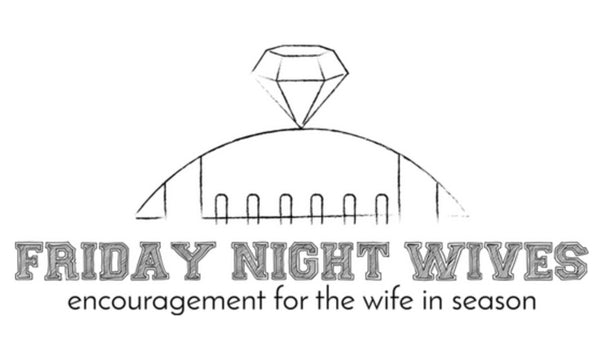It's difficult to live a proactive life when much of the day we feel like we're running from one fire to the next, accomplishing very little. When the athletic season starts (in my case, football), that carefully stacked pile, otherwise known as a weekly to-do list, quickly shifts from manageable to tolerable to overwhelming.
I've learned a lot of lessons partnering with Ordell for the last twenty football seasons. One vital one is that if I don't take time to create calendar space to thrive in my own calling, I risk resenting the football season, and worse, my husband.
Here's the truth: you have a specific calling on your life, and it is just as valuable to God, your family, and your community as your husband's calling. God doesn't make mistakes. You are one of his most amazing creations, the one he made in his image and deemed "very good." We are complex and detailed, but our designer has a plan. It's up to us whether or not we will embrace our full calling.
Here's another truth. Right now, coaching families are stretched thin emotionally, mentally, financially, and in some cases, spiritually. We have no idea what the weeks ahead will look like, so it seems reasonable to justify avoiding new things. Haven't we been stretched enough in 2020?
It's Time to Take the Next Brave Step
The thing about living on mission in the sweet spot of our calling is that we don't have to wait for our kids to be a certain age, our bank accounts to hold a specific amount, or even for a pandemic to end. When we take time to refocus our energy, efforts, and goals to align with what God is calling us to accomplish in partnership with him, we will thrive.
Understanding your calling and then taking steps to put things into action isn't always easy. It required me, first, to admit I'm not a perfect multi-tasker. It also meant I needed to stop using busyness as an excuse for avoiding scary things. There were things God was calling me to dive into more deeply, which felt hard, but when I took brave steps weren't as difficult as I'd expected, like writing a book.
Being busy seemed like the perfect rationale for saying no to God. But here's the thing. God is never satisfied with part of our hearts. He loves us too much to allow us to settle, even when it requires us to stretch out of our comfort zones.
As an athletic training major, stretching athletes was an everyday discipline. One of the most interesting things about muscles is that they have excellent memory. In some cases, tight muscles will cause you to feel referred pain. For example, many people experience lower back discomfort and assume they need to massage or stretch their backs when tight hamstring muscles are the real cause of their issues.
Here are a few things you may not know about stretching
• It improves your joint range of motion
• It improves your athletic performance
• It decreases your risk of injury
• It helps your joints move through their full range of motion
• It enables your muscles to work most effectively
• Uneven stretching can cause harm. You need to stretch both sides of your body equally.
• Tension when stretching is good; pain when stretching is dangerous and can cause harm.
• Stretches should be held for longer than you likely prefer to be most effective
• A partner stretch is an excellent way of encouraging your muscles to lengthen more than can be accomplished when you stretch alone.
• Most muscle injuries could be prevented with consistent stretching.
It was my experience that most athletes hated stretching. The best ones understood the necessity and disciplined themselves to make it a part of their routines, but every day, we would chase them down and remind them to stretch. Many times, they would skip the process and get away with it for a while. But the thing about stretching is that avoiding it always catches up with you.
Eventually, a pulled hamstring, quad, or calf would sideline someone for a week or longer. Do you know the most ironic part of these injuries? The treatment, in most cases, is rest with a protocol of heating and icing, followed by gentle stretching.
That's right. The way to heal an injury from not stretching is to stretch.
I, too, fall into the category of disliking stretching. It takes time away from my workout, forces me to be still when I prefer activity, and causes some discomfort—just like most hard things in life.
Ordell often reminds his teams that we gain success when we focus on controlling the things we can control instead of the things we wish we had power over.
In my book Lessons from the Sidelines, I've compiled seven exercises to help you control the thing you can best control: your response.
The journey of finding your sweet spot is an exercise in stretching your mental muscles. You're unlikely to enjoy every stage, but in the end, you'll be further down the road toward understanding your calling. Are you ready to take the next brave step?


